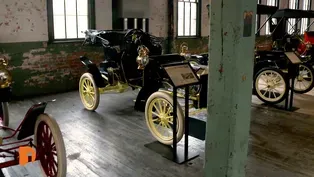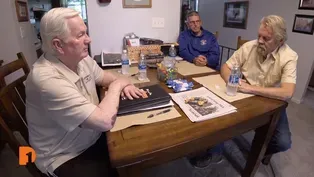
Detroit People’s Food Co-op broadens healthy food access
Clip: Season 8 Episode 45 | 6m 19sVideo has Closed Captions
The Detroit People’s Food Co-op grocery store has opened in the North End neighborhood.
A new Black-led, cooperatively owned grocery store has opened in Detroit’s North End neighborhood. The Detroit People’s Food Co-op, a $21 million project, started welcoming shoppers on May 1. BridgeDetroit reporter Jena Brooker and One Detroit’s Jonathan Shead examine the impact the food co-op will have on healthy food access and economic development in the city.
Problems with Closed Captions? Closed Captioning Feedback
Problems with Closed Captions? Closed Captioning Feedback
One Detroit is a local public television program presented by Detroit PBS

Detroit People’s Food Co-op broadens healthy food access
Clip: Season 8 Episode 45 | 6m 19sVideo has Closed Captions
A new Black-led, cooperatively owned grocery store has opened in Detroit’s North End neighborhood. The Detroit People’s Food Co-op, a $21 million project, started welcoming shoppers on May 1. BridgeDetroit reporter Jena Brooker and One Detroit’s Jonathan Shead examine the impact the food co-op will have on healthy food access and economic development in the city.
Problems with Closed Captions? Closed Captioning Feedback
How to Watch One Detroit
One Detroit is available to stream on pbs.org and the free PBS App, available on iPhone, Apple TV, Android TV, Android smartphones, Amazon Fire TV, Amazon Fire Tablet, Roku, Samsung Smart TV, and Vizio.
Providing Support for PBS.org
Learn Moreabout PBS online sponsorship(light music) - A new black-led cooperatively owned grocery store has officially opened in Detroit.
The Detroit People's Food Co-op on Woodward near East Grand Boulevard, started welcoming shoppers on May 1st.
It focuses on providing access to culturally relevant healthy foods.
What would be the impact of having such a big grocery store open up in the north end in Detroit on the local economy?
- We are focused on uplifting black people, and what we find is that when the people who are most marginalized and most oppressed in society are lifted up, everybody benefits.
We expect that The Detroit People's Food Co-op will stimulate the local food economy, focusing centering black people who are playing within that kinda space, but also it's going to benefit the entire local food economy.
- [Jena] The Detroit Black Community Food Sovereignty Network, D-B-C-F-S-N for short, spearheaded the co-op project.
It also runs D-Town Farms on Detroit's West side.
Yakini said DBCFSN and the Co-op were created out of the need for greater health equity across the city.
- Gonna get a pound of spinach.
We were concerned about the lack of access to good high quality food, but even equally as importantly, we were concerned about the lack of self-determination and the economic extraction from black communities.
- [Jena] After losing roughly a dozen grocery stores in Detroit over the last decade, the co-op will fill a much needed gap for many Detroiters.
- We see in some specific areas, there's been multiple grocery stores that have left.
You know, there's areas now on the east side that are very much pockets where access to food opportunities is very limited.
One store in particular closed, and it was across the corner from a high rise senior living facility.
And all those folks would just walk across the street to get their groceries and now they can't.
- [Jena] Hill has been mapping Detroit's grocery store landscape and studying food access since 2011.
The United Ways Alice Report provides a peak into food security for Detroiters.
- In Detroit, it's like 70% of households that meet that Alice Threshold where, you know, they're very likely facing food insecurity on some semi-regular basis.
The housing development happening in the north end, tied with this food co-op development that is also so community rooted, it's gonna be an amazing access point for a lotta people.
- [Jena] But the co-op is focused on more than just healthy food access.
- Black farm land.
- Doctor Shakara Tyler of DBCFSN wants to increase people's understanding of the full process, from seed to shelf.
The local food will be traveling less miles to get to the shelves.
It's really important that we uplift how many Detroiters will now have access to local foods that sometimes can be hard to nail down.
Most of our food travels from miles and miles away, California, Mexico, Florida, Georgia.
And so we wanna really uplift the food that's being grown here in Detroit.
- [Jena] The co-op plans to source fresh produce from black run farms like D-Town Farms, the Oakland Avenue Farm, and the Green Boots Project.
It will also stock food and wellness products from more than 40 local vendors.
- We have a model of 50/50, so like 50% healthy and organic, 50% clean and conventional.
So you'll see products that you're used to seeing right next to products that you are not used to seeing.
- [Jena] Okay.
- I'll give you one example.
We had a couple of member owners saying, "Oxtails, we like oxtails, "and you cannot find that in most grocery stores."
(people speaking indistinctly) - [Jena] Shoppers will also seek cookies and other products from Zella's Bakery, a plant-based bakery created by two sisters from Detroit in 2015.
- We've been waiting on this, we've been waiting on a co-op, we've been waiting on, you know, a black lead store that could speak to food sovereignty the way that you know this one does.
It meets the needs of the people centralized in an area that, you know, whether you live east or west, you can get here right off of Woodward.
It gives us an opportunity to send our products into a store where they have beliefs as we have, and want wanting to feed our people, and feed them in a healthy way.
(tractor rumbling) - We're trying to be very thoughtful about the partnerships that we build and the role we play, both in creating a self-determining food economy, but also the role we're playing in a highly gentrifying neighborhood.
- [Jena] Research from Fair Food Network, shows that Detroiters spend an average of 300 million to 500 million annually on groceries in the suburbs.
- It's a insane amount of money that leaves the city in grocery money.
Any thriving city you have opportunity and you have choice.
And I think that's the most important part for Detroiters, like they deserve choice.
And you know, it shouldn't just be that they can walk to this grocer or they can drive 30 minutes to this one.
- [Jena] In the past two years, Detroit has added two other new black-owned grocery stores, Neighborhood Grocery and Linwood Fresh Market.
More than adding another grocery store for Detroiters, the co-ops leadership hopes it can be an example for what's possible.
- I completely believe in the fact that anywhere on the planet that anyone lives where there's children, the children should see the adults creating solutions that are culturally relevant, and that are necessary for that city, that village, those people.
- If people can see that we can feed ourselves through a economic cooperative model, maybe we can clothe ourselves, maybe we can house ourselves.
It reverberates outward beyond just food.
So if you are not already a member, please become a member because this is what we need.
The building black food sovereignty is a participatory process, so we need all head, hearts, hands on deck, this is the community process.
(people talking indistinctly)
Ford Piquette Avenue Plant Museum preserves Detroit history
Video has Closed Captions
The Ford Piquette Avenue Plant Museum is preserving Detroit’s automotive history. (4m 6s)
One Detroit Weekend: May 10, 2024
Video has Closed Captions
Celebrate Mother’s Day, Asian American and Pacific Islander Heritage Month and more. (1m 53s)
Veterans push to rename Post Traumatic Stress Disorder
Video has Closed Captions
Two Michigan Vietnam veterans are pushing to rename Post Traumatic Stress Disorder. (9m 5s)
Providing Support for PBS.org
Learn Moreabout PBS online sponsorshipOne Detroit is a local public television program presented by Detroit PBS














